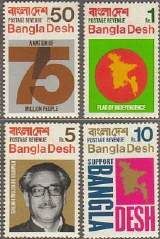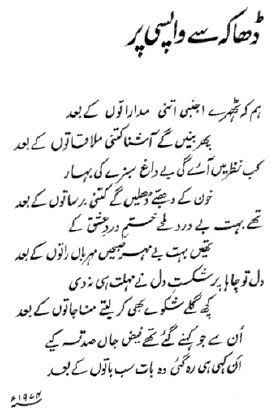Adil Najam
 As the fourth part of our series on the events of 1971, we are reposting this post which was first published at ATP on December 16, 2006. We are reposting it with all the original comments since they, as a whole, are very much part of the conversation we all need to have with ourselves. The previous three parts of the series can be read here, here and here.
As the fourth part of our series on the events of 1971, we are reposting this post which was first published at ATP on December 16, 2006. We are reposting it with all the original comments since they, as a whole, are very much part of the conversation we all need to have with ourselves. The previous three parts of the series can be read here, here and here.
Today is December 16.
Today Bangladesh will mark its 35th ‘Victory Day.’
 Most Pakistanis will go about their lives, not remembering or not wanting to remember. We should remember – and learn – from the significance of this date.
Most Pakistanis will go about their lives, not remembering or not wanting to remember. We should remember – and learn – from the significance of this date.
Not because it marks a ‘defeat’ but because it marks the end of a dream, 24 years of mistakes, horrible bloodshed, traumatic agony, and shameful atrocities. The constructed mythologies of what happened, why, and who is to be blamed need to be questioned. Tough questions have to be asked. And unpleasant answers have to be braced for. We need to honestly confront our own history, for our own sake.
But right now, the goal of this post is different. We at ATP just wish to extend a hand of friendship to our Bangladeshi friends. May the memories we make in our future be very different (and more pleasant) than the scars we carry from our past.
There is much – too much – that I wish to say; but cannot find words for. So let me do what I always do when I am at a loss of words. Let me quote Faiz Ahmad Faiz, who in his memorable 1974 poem ‘Dhaka say wapsi par’ (On Return from Dhaka) expressed what I wish to say so much better than I ever could.
We share with you here the original poem in Urdu, a version in ‘Roman Urdu,’ a wonderful English translation of the poem by the late Agha Shahid Ali in his book The Rebel’s Silhouette, and a video of Nayarra Noor singing the verses with the passion and feeling that they deserve.
ham ke Thehre ajnabi itni mulaaqaatoN ke baad
phir baneiN ge aashna kitni madaaraatoN ke baadkab nazar meiN aaye gi be daaGh sabze ki bahaar
khoon ke dhabe dhuleiN ge kitni barsaatoN ke baadthe bahut bedard lamhe khat’m-e-dard-e-ishq ke
theiN bahut bemeh’r subheiN meh’rbaaN raatoN ke baaddil to chaaha par shikast-e-dil ne moh’lat hi na di
kuchh gile shikwe bhi kar lete manaajaatoN ke baadun se jo kehne gaye the “Faiz” jaaN sadqe kiye
an kahi hi reh gayi woh baat sab baatoN ke baad
Agha Shahid Ali’s Translation:
After those many encounters, that easy intimacy,
. we are strangers now —
After how many meetings will we be that close again?When will we again see a spring of unstained green?
After how many monsoons will the blood be washed
. from the branches?So relentless was the end of love, so heartless —
After the nights of tenderness, the dawns were pitiless,
. so pitiless.And so crushed was the heart that though it wished
. it found no chance —
after the entreaties, after the despair — for us to
. quarrel once again as old friends.Faiz, what you’d gone to say, ready to offer everything,
. even your life —
those healing words remained unspoken after all else had
. been said.





















































Thank you for writing this. The good thing it proves is that there are a few at least who want to think about this event in a sober and thoughtful way.
The bad thing is that most comments prove that we have learnt nothing from this at all. So many are still trying to twist history to prove whatever their current politics is and trying to use this tragic event to make cheap shots against whatever ethnicity or institution they do not like. The type of ethnic hatred that had led to 1971 seems well and alive here. We still speak the language of hate as the last few comments show, only the subject of our hate changes. Go ahead people, if it pleases you to distort history and find easy scapegoats, then do so. If finding an easy culprit (anyone but you yourself) makes you feel good, then good for you.
When we become mature enough and honest enough to face ALL the facts then maybe we can discuss how ALL of us are culprits. The language riots over Urdu and the role of Liaquat and other Mohajir leaders in that, the politics of the Karachi leaders who villified Bengali founding fathers (for example, Surhawardy) by questioning their patriotism, the Pathan President Ayub Khan who considered Bengalis a lesser race, the Punjab dominated Army that was sent to quelch the uprising, the Mohajir-dominated Civil Service that refused to consider Bengalis their equals, the Sindhi leader Bhutto who would not agree to letting the election winner take power, the religious parties that fueled the massacre through their malitias. In reality, all of us.
One day I hope we will be mature enough to recognize our own guilt. Until then, go ahead and happily blame someone else, whoever you happen to dislike. just remember that by doing so you are doing exactly the same thing that an earlier generation did. Creating rifts and hatred within your own national fabric.
Perhaps, the Pakistani state would not repeat the mistakes and treat the Baloch and other tribes with respect. Development should reach to areas away from Karachi and Lahore.
On this day, Pakistan was broken into two pieces; but the worst thing is that noone remembers this day in Pakistan…how can we forget so easily?
pakistanis and bangalis are two different qaum and should not have been together in the first place. most of the political instability in pakistan’s early history was caused because bangali politicians were against the blueprint of state being proposed by rest of pakistan. pakistanis wanted a government built upon the islamic heritage of south asia. bengalis otoh, its hard to say what they wanted as evidenced by the political turmoil in bangladesh after independence. bangladesh in its short history has seen more military coups than pakistan has since its independence.
mujib himself started the slide downwards by setting up probably the worst government in the post-colonial history of south asia. to get a better idea of mujib’s rule, check out the following report from u.s. library of congress. ironically, in the end, mujib was treated much more harshly by bangali army than by pakistani army:
http://lcweb2.loc.gov
“…After the election, the economic and security situations began to deteriorate rapidly, and Mujib’s popularity suffered further as a result of what many Bangladeshis came to regard as his close alliance with India.
…In January 1975, the Constitution was amended to make Mujib president for five years and to give him full executive powers. The next month, in a move that wiped out all opposition political parties, Mujib proclaimed Bangladesh a one-party state, effectively abolishing the parliamentary system.
…On the morning of August 15, 1975, Mujib and several members of his family were murdered in a coup engineered by a group of young army officers, most of whom were majors…”
as far as pakistan is concerned we are better off. the language issue, which was one of the most vexing problems in the early history of pak, was automatically resolved with the separation of east-pakistan. furthermore, given the distances involved and the fact that bangladesh is surrounded by india on three sides, pakistan’s defence would have continued to be stretched because of east-pakistan. an indian prime minister has stated on record that india committed a strategic blunder by separating east pakistan.
bangladesh is also much poorer country than pakistan and we would have transfer resources to bangladesh. for comparison, bangladesh’s budget is less than half of that of budget of pakistan and bangali exports are about 2/3 of pakistan’s export despite bangladesh enjoying ldc status.
overall i think too much is made by some sections of pak society on this issue. bangalis did not want to live with us just as we did not want to live with indians. bangalis are now in control of their own destiny. good luck to them.
excellent post adil bhai and this day reminds us that we have still not learnt lesson from past and we are still being victim of internal colonization by Punjab and other provinces are still struggling for provincial autonomy and they are still being raped by ‘Big Brother’. As long as we kept ignoring facts and keep considering Punjab as holy as god, pakistan would keep suffering, yesterday was East Pakistan, tomorrow could be Sind,Balochistan or NWFP. The 71 incident reminds us that you can’t apply military force against the wishes of awam. It also reminds how democracy was offended big time by west Pakistan by not giving Mujeeb power to rule the combined state. By coming up things that India did this or Mujeeb was agent or ‘Kala bangali’ etc etc can just amuse us but can’t hide facts. It’s sad that Punjab has still not learnt lesson and keep following what it was done in past. What Pakistan was facing in late 60s is not different than Pakistan facing today but we are the nation who prefer to live in illusionary world rather in reality.
It’s said that I only saw 2 posts about this issue. It seems we have forgotten our past. So sad;/